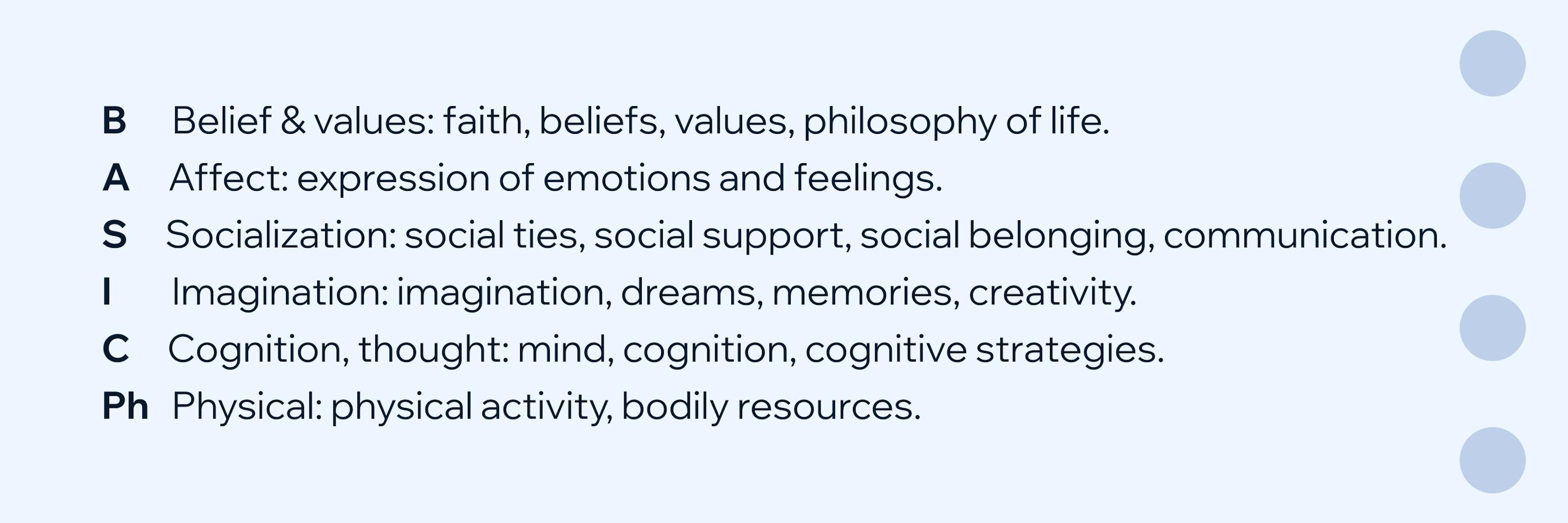Tetyana Pavlin: about the BASIC Ph model and developing resilience
The integrative multidimensional model BASIC Ph is a tool that helps identify resources for each individual, provides knowledge about the value of these resources, and consequently promotes the development of resilience.

BASIC Ph
Israeli psychologist Mooli Lahad concluded that stress and crises are usually overcome with the help of B (belief and values) - beliefs, A (affect and emotions) - emotions, S (sociability) - social support (family, groups, friends), I (imagination and creativity) - imagination, C strong> (cognition and thought) - thinking (cognition, thoughts), <strong >Ph (physiological activity) - physical (body, exercises). Everyone uses these resources, but often relies heavily on one or two while neglecting the others. A simple and small test can help determine which resources are most prominent for you and which ones you use less. The test is included in the textbook Fundamentals of Rehabilitation Psychology: Overcoming the Aftermath of a Crisis, Volume 2 (link below). The test questions can be used in counselling to help clients identify their leading stress-coping strategies and those that are underused or not used at all.
Developing Resilience and Overcoming Stress
For developing resilience, it is important to be aware of your strengths and strategies as well as to develop passive ones. For example, if it is important for you to accurately assess a situation by gathering as much information as possible, you like to always act according to a well-tested plan, regularly train yourself, practice self-discipline, and it is important for you to have a realistic future scenario, this may indicate a well-developed cognitive way of coping with stress. Often, those who excel at rational assessment of situations forget about their emotions. Therefore, if you are aware of this side of yourself, it may be time to consider how to master a new strategy and improve skills in sharing thoughts and concerns with those close to you, remember a hobby that fills you with pleasant emotions, sometimes allow yourself to cry, talk about your sadness, and openly ask for care and emotional support from loved ones.
Mooli Lahad's model opens up opportunities for us to see a variety of sources where we can draw strength and inspiration to cope with difficulties, and also demonstrates many ways to strengthen ourselves and our loved ones. There are enough resources for recovery, they are sufficient for everyone and are accessible.
Conclusion and recommendation
So, never give up and try to improve your well-being by turning to faith, beliefs that support you, such as, "I can handle it," "I will get the job (complete the task)," etc. Look for statements that inspire you personally. Do not be afraid of your feelings; they are varied, but there are no bad or good emotions. Emotions are friends who help you understand how you feel: what you dislike causes dissatisfaction, and what you like brings joy. Listen to yourself and name your feelings (at least to yourself). Share your feelings and thoughts with friends (close ones), strangers, colleagues. You determine the level of distance with others, but there is no reason to be closed off. Communicate, befriend, socialize, sympathize, express your feelings to show people your boundaries—these are all integral parts of quality communication. Fantasize! Did you get into an unpleasant situation? Imagine what you would like instead of what is, how to fix what happened or reduce the negative consequences. Lacking information? Think, find information, consult with those who have been in the same situation, analyze what you have, come up with solution options. The body also collects information, and to "reset" it, you should walk, exercise, get a massage, swim, move in a way that is accessible to you.
Good luck!
Sources:
- Lahad, M., Shacham, M., Ayalon, O. (2013) The "BASIC PH" Model of Coping and Resiliency -Theory, Research and Cross-Cultural Application. London: Jessica
- Fundamentals of Rehabilitation Psychology: Overcoming the Consequences of the Crisis. Volume 2, Publisher Organization for Security and Co-operation in Europe













